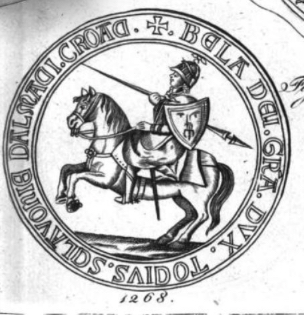Related Research Articles

Tomasina Morosini was a 13th-century Venetian noblewoman and member of the powerful Morosini family. She was the mother of Andrew III, the last king of Hungary from the Árpád dynasty. After his son's accession to the throne, she moved to Hungary in 1292, where she served as Duchess of Slavonia until her death.
Stephen the Posthumous was the posthumous son of King Andrew II of Hungary by his third wife, Beatrice d'Este. He was regarded as bastard son of infidelity by his much older half-brothers, including King Béla IV of Hungary, and was not allowed to receive ducal revenues from Hungary to which he would have been entitled as son of a Hungarian king.
Mizse was a noble in the 13th century in the Kingdom of Hungary, who served as the last Palatine of King Ladislaus IV of Hungary in 1290. He was born in a Muslim family, but he converted to Roman Catholicism.

Béla was the youngest and favorite child of King Béla IV of Hungary. His father appointed him Duke of Slavonia in 1260, but he only started to govern his duchy from 1268. He died childless.
Ampud, also Ampod, Apod or Ompud was a powerful aristocrat in the Kingdom of Hungary in the second half of the 12th century. He was Ban of Slavonia between 1163 or 1164 and 1171 or 1174, and Palatine of Hungary from around 1164 till around 1176.

Peter, son of Töre was a Hungarian lord, who served as judge royal in 1198, during the reign of King Emeric.
Atyusz III from the kindred Atyusz was a Hungarian influential baron, the most outstanding member of his family, who served as Judge royal from 1215 to 1217, during the reign of Andrew II of Hungary.
Atyusz from the kindred Hahót was a Hungarian noble, who served as ispán of several counties in the second half of the 13th century. He was also the ancestor of the Szabari noble family.
Stephen Sáfár de Csév was a Hungarian diplomat, soldier and noble in the first half of the 14th century, a loyal supporter of Charles I of Hungary and his consolidation efforts. In this regard, Stephen served as ispán of Pilis County and castellan of Visegrád Castle, simultaneously from 1318 until his death.
Nicholas (I) Kőszegi was a Hungarian influential lord in the second half of the 13th century. He was a member of the powerful Kőszegi family. He served as Palatine of Hungary at various times between 1275 and 1298. He was also Ban of Slavonia twice. Albeit he participated in several rebellions against the royal power, he proved to be more moderate and conformist than his younger brothers. He swore loyalty to Andrew III of Hungary after their failed rebellion in 1292. In comparison to the other branches of the Kőszegi family, Nicholas' branch remained relatively insignificant, as he did not establish an oligarchic province independently of the king, unlike his brothers. Nicholas was ancestor of the Rohonci family, which flourished until the mid-15th century.
Bachaler Olaszkai was a Hungarian medieval soldier and lesser noble in the second half of the 13th century. He served as castellan of Koprivnica (Kapronca) in 1272, when King Stephen V's son and heir, Ladislaus was abducted and imprisoned there.

Nánabeszter or Nána-Beszter (Nanabezter) was the name of a minor gens in the Kingdom of Hungary, which mostly possessed lands along the river Danube in Central Hungary, around the capitals Esztergom and Buda. After their only known branch, which existed until the early 14th century, the clan was also known as Berki family.
Thomas from the kindred Nánabeszter was a Hungarian nobleman and soldier at the turn of the 13th and 14th centuries, who possessed several domains along the river Danube in Central Hungary, surrounding the capital Buda at that time. Being the last member of the Nánabeszter clan, he was also known as Thomas Berki after his main residence.
Demetrius (I) from the kindred Rosd was a Hungarian nobleman and soldier in the second half of the 13th century. He served as ispán of Kraszna, Szatmár counties and the royal lordship of Telegd in 1272.
Tiburtius (I) from the kindred Rosd was a Hungarian distinguished nobleman at the turn of the 12th and 13th centuries, who served as ispán (head) of various counties during the reign of kings Emeric then Andrew II.
Eyza or Heyza was a noble at the turn of the 13th and 14th centuries in the Kingdom of Hungary. He was born in a Muslim family, but he converted to Roman Catholicism. Based on the 15th-century Buda Chronicle, former historiographical works also referred incorrectly to him as Lizse.
Thomas was a Hungarian prelate in the 13th century, who served as Bishop of Vác from 1278 until his assassination. Simultaneously, he served in the royal court in various positions. He was a faithful confidant of King Ladislaus IV of Hungary.
Andrew was a Hungarian lord at the end of the 12th century, who – as a confidant of the rebellious Duke Andrew – served as Ban of Slavonia. Through his marriage, he was son-in-law of the late King Géza II of Hungary.

Baldo da Passignano was an Italian noble and poet from the Republic of Florence. He was expelled from Florence in 1268, because of his staunch Ghibelline position. He lived in exile in the Kingdom of Hungary for a decade in the 1290s, during the reign of Andrew III. As a member of the royal court, Baldo served as ispán (count) of Szepes County from 1291 to 1301 and, simultaneously, ispán of the royal chamber between 1291 and 1292.

The House of Tonisto was a Venetian noble family, which reached its peak in the first half of the 13th century.
References
- 1 2 3 4 Bácsatyai 2023, pp. 1184–1185.
- ↑ Zsoldos 2011, p. 267.